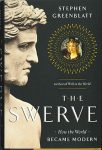

That model, inspired by Foucault, suggested that the expression of new and apparently revolutionary ideas played into a game of power that allowed the cultural orthodoxy of a dominant social order to reassert, and even to strengthen, itself.

It departs from Greenblatt’s earlier notion of cultural subversion and containment that he developed in a discussion of Shakespeare’s Henry IV plays and which has influenced a generation of scholar-critics. The swerve is as good a metaphor as any for the mysterious process of cultural as well as physical change, where small events can have far-reaching and unintended consequences.

It is the Lucretian version of the Big Bang. This shift was the Renaissance itself, the “swerve” of Stephen Greenblatt’s title, which refers as well to Lucretius’s doctrine of the “clinamen” or sideways turn, which, however random and infinitesimal, could trigger a chain reaction in atoms otherwise falling through the infinite void of space, and thereby form our world: the Earth and stars and their inhabitants.

That the Renaissance poet should have identified himself and his own masterpiece with Lucretius attests to a major shift in Western cultural history. No wonder the Christian saint said that Lucretius was mad. They should free themselves from the fear of death itself: when you are dead you will not know the difference. De Rerum Natura expounds in epic verse for Roman readers the science taught by the Greek philosopher Epicurus in the third century B.C.E., much of which sounds astonishingly up to date to modern readers: that the gods exist but have no care for humanity, nor are they the creators of the universe (and so they may as well not exist) that the universe is infinite, eternal, and ever-changing, formed by the chance collision of atoms, the basis of all things animate and inanimate that our particular part of it came into being in time and will fall apart again to reform in another configuration of atomic matter that the human soul dies with the body, and there is no afterlife, and men and women should free themselves from the fear that religion inculcates of punishments or rewards after death.


 0 kommentar(er)
0 kommentar(er)
